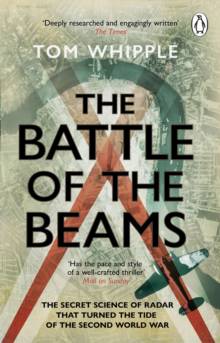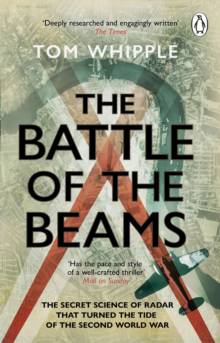
Bedankt voor het vertrouwen het afgelopen jaar! Om jou te bedanken bieden we GRATIS verzending (in België) aan op alles gedurende de hele maand januari.
- Afhalen na 1 uur in een winkel met voorraad
- In januari gratis thuislevering in België
- Ruim aanbod met 7 miljoen producten
Bedankt voor het vertrouwen het afgelopen jaar! Om jou te bedanken bieden we GRATIS verzending (in België) aan op alles gedurende de hele maand januari.
- Afhalen na 1 uur in een winkel met voorraad
- In januari gratis thuislevering in België
- Ruim aanbod met 7 miljoen producten
Zoeken
The Battle of the Beams
The secret science of radar that turned the tide of the Second World War
Tom Whipple
Paperback | Engels
€ 15,45
+ 30 punten
Uitvoering
Omschrijving
Summer 1939. War is coming. The British believe that, through ingenuity and scientific prowess, they alone have a war-winning weapon: radar. They are wrong. The Germans have it too. They believe that their unique maritime history means their pilots have no need of navigational aids. They are wrong. Most of the bombs the RAF will drop in the first years of the war land miles from their target. They also believe that the Germans, without the same naval tradition, will never be able to find targets at night. They are, again, wrong. In 1939 the Germans don't just have radar to spot planes entering their airspace, they have radio beams to guide their own planes into enemy airspace. This war will be fought on land and sea and in the air, but it will also be fought on the airwaves. It will be fought between scientists on both sides at the forefront of knowledge, and the agents and commandos they relied on to bolster that knowledge. Thanks to one young engineer, Reginald Jones, the British develop radar technology that went on to help the Allies win the war. Relying on first-hand accounts from Reginald Jones as well as papers recently released by the Admiralty, The Battle of the Beams fills a huge missing piece in the canon of World War II literature. It is a tale that combines history, science, derring do and dogged determination and will appeal as much to fans of World War II history as to those fascinated by the science behind the beams that changed our lives. The radio war of 1939-45 is one of the great scientific battles in history. This is the story of that war.
Specificaties
Betrokkenen
- Auteur(s):
- Uitgeverij:
Inhoud
- Aantal bladzijden:
- 320
- Taal:
- Engels
Eigenschappen
- Productcode (EAN):
- 9780552177801
- Verschijningsdatum:
- 6/06/2024
- Uitvoering:
- Paperback
- Formaat:
- Trade paperback (VS)
- Afmetingen:
- 127 mm x 197 mm
- Gewicht:
- 220 g

Alleen bij Standaard Boekhandel
+ 30 punten op je klantenkaart van Standaard Boekhandel
Beoordelingen
We publiceren alleen reviews die voldoen aan de voorwaarden voor reviews. Bekijk onze voorwaarden voor reviews.









